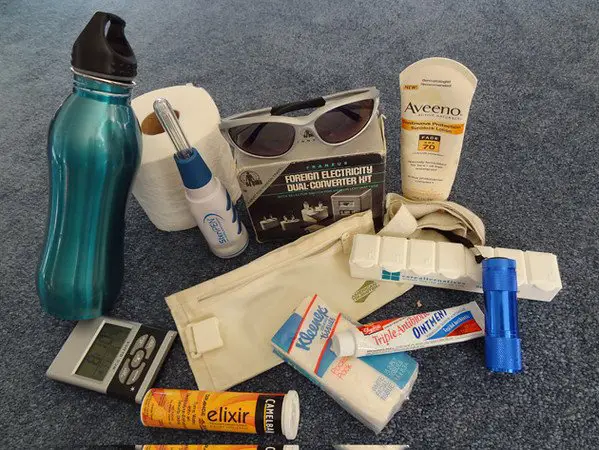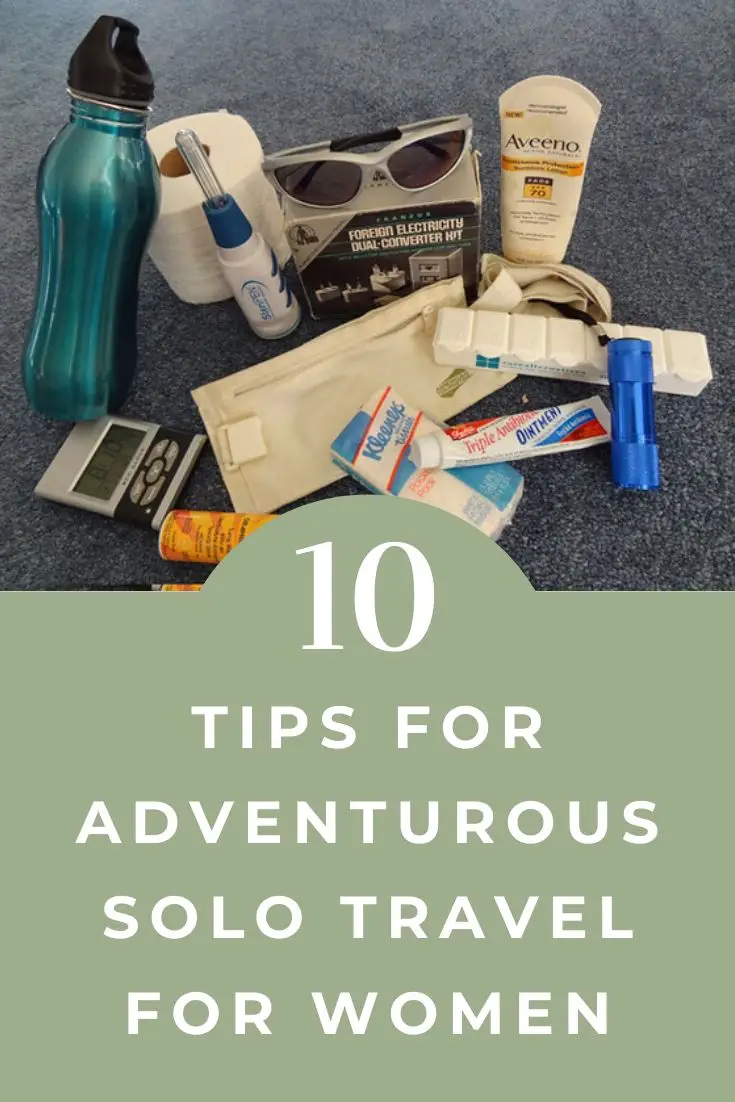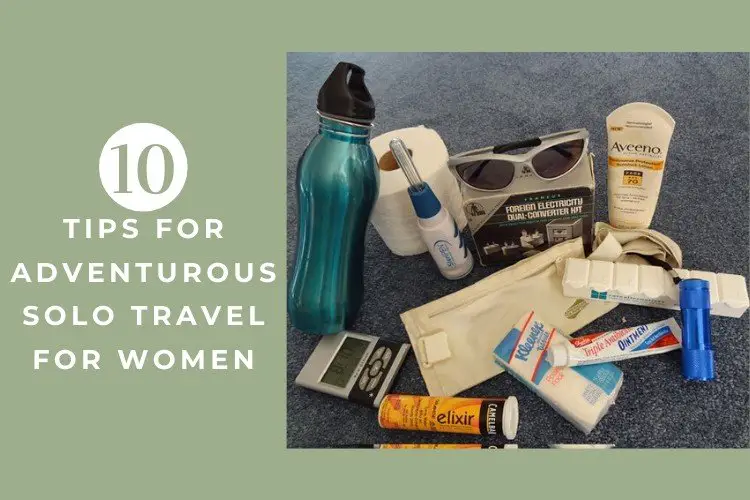Travel Belles know that exploring the world has its rewards: seeing beautiful scenery, meeting new people, experiencing different cultures and, of course, trying the delicious flavors of other countries.
Still, we also recognize that adventures often come with challenges, especially when traveling alone. With the right kind of preparation, though, you can minimize or even eliminate certain problems and hazards.
Here are 10 tips for adventurous solo travel for women and smooth sailing on your next big solo trip.

10 Solo Female Travel Tips
1. Finances
You don’t want to find yourself in a foreign country without access to cash. Set up a special checking account with only a little more money than you will need for your trip. It’s important to do this at least three or four months in advance to allow enough time for the permanent ATM/debit card to arrive; if the temporary card expires while you are traveling, you could end up seriously cash-strapped.
Traveler’s checks are fairly obsolete these days, so you will rely heavily on your ATM/debit card to get local currency and ready cash, especially on weekends and holidays.
Always double-check with the bank that the card will work in the place where you’ll be traveling. Also, make sure your credit card company knows when and where you will be going so they don’t refuse any charges on the assumption they are fraudulent.
2. Document and money protection
A money belt may not be the most flattering look, but it will keep your cash and important documents safe. Money bags tend to absorb the sweat in the waist area, so it’s a good idea to put your passport, health insurance card and other documents in a plastic bag before securing them in the money belt.
Your money, credit and debit cards should go in another plastic bag. Put enough money in a purse or fanny pack for your daily use so you don’t have to keep exposing the money belt. Always put a copy of your passport photo and info in a separate, secure place, like a compartment in your backpack or bag, along with a copy of your credit and debit card numbers and emergency phone numbers. Double-check that you have any necessary visas. Losing an important document could put you in a vulnerable position. And if something happens, seek out your home country’s embassy.
3. Safety
Bring a small flashlight. The kind that loops on the outside of your backpack or purse is especially useful because it’s easy to find in the dark. Never wander the hallways of a hostel or hotel at night, especially on your way to or from shared bathrooms. Never wander anywhere alone in the dark without a flashlight and something to protect yourself with. You can no longer fly with a Swiss Army or other utility knife or pepper spray in a carry-on, but you can pack them in your checked bag.
A utility knife can be handy for many things but is an important weapon/deterrent to keep in a pocket or fanny pack just in case. Keep it by your pillow when sleeping in dorm hostels.
Check out this recent post by Melanie Williams who’s been traveling solo around Mexico for 2 years with more great safety tips.
4. Security
Keeping yourself safe is important, but you’ll also want to take care of your things, too. Purchase small locks and at least one large lock for all of your backpack or suitcase compartments. Don’t put the locks on until you’re through customs at your destination, because airlines and customs agents will sometimes cut locks open to inspect baggage. Once you are out of the airport, secure all openings in your luggage, particularly if you plan on taking some form of public transportation.
If traveling by train or bus, you can use the large locks to secure your backpack or suitcase handles to the luggage railings above your seat so you can use the bathroom or nod off without having to hold onto the bag. And for the hotel or hostel, bring a rubber doorstop in case the lock isn’t reliable. No one will be able to open the door, not even hotel staff.

5. Healthcare
Feeling sick when thousands of miles from home can be miserable, so don’t forget to talk to your doctor before you jet off. Make sure all of your vaccinations are up to date, and as far as packing goes that you have all possible medications for any illness that the area is known to harbor. You certainly don’t want to end up sick in a hospital or clinic by yourself, even in a country where you know the language. Always pack a small first aid kit that includes an antibiotic cream.
A small infection from a simple cut can become a large nightmare in a third-world country. It’s also helpful to carry along a small supply of aspirin, antacids, and more than enough of your prescription medications in the original bottle with the label.
6. Hygiene
Bring packets of tissues and moist towelettes as well as things for those female “emergencies” like tampons and panty liners. You can use the thin panty liners all the time to keep your underwear fresh, so you only have to wash them every other day if you don’t sweat a lot. Also, bring along a handkerchief or washcloth since many foreign bathrooms don’t offer anything with which to dry, or even sometimes wash, your hands. A roll of toilet paper can also be handy.
Keep a small, folded wad or roll in a pocket for those poorly equipped bathrooms. And remember, although washing with water is more hygienic and better for the plumbing and environment, you can get an infection from using the water from buckets or hoses in public toilets like in train stations.
7. Hydration
Sometimes when overwhelmed by the sights and sounds of a new place, it’s easy to forget to hydrate. Even when not traveling in a hot climate, you can grow dehydrated if you don’t drink about 2.5 liters of water every day. You should drink more than that if you are traveling in a hot climate. Bottled water can be expensive, sometimes unavailable, and not always safe for foreigners, while plastic bottles also pose an environmental hazard. You can bring a reusable bottle with you. Many hotels and hostels will boil water for you in the kitchen if you ask, and some hotels offer electric kettles in the room.
You can also purchase a steri-pen water purifier, which works by dipping the pen into the water in a steel water bottle (it must be made of stainless steel) and twirling it around until the ultraviolet light goes out. Just like that, you have purified drinking water! And to get a little extra out of your water, bring packets of electrolyte powder to mix with it.
8. Laundry
You’ll probably want to wash clothes, especially underwear, in your hotel sinks as you travel, especially on long trips. A flat rubber drain stopper is helpful, but if you forget to pack one, try using a washcloth as a plug for the sink. Also, bring string. You can tie a line from a chair to a window or another chair to hang up your clothes for drying. And of course, throw some of those small, travel-size packets of detergent in your bag, or just use hand soap or shampoo, which can be equally effective. For those clothes you don’t end up washing, bring along a plastic bag to keep them separate from your clean garments.
9. Clothing
Do your research ahead of time and pack climate-appropriate, but also culturally appropriate clothes. Many countries outside of Western Europe and America are very conservative, so don’t wear shorts and sleeveless shirts even if it is hot. Instead, opt for light-colored, cotton pants or skirts and blouses or T-shirts, which are cool but modest enough to not invite unwanted attention. Women dressed in clothes the locals see as immodest are prime targets for assaults and harassment. Sometimes it can even help to wear a wedding ring, even if it’s fake. Depending on the country you’re traveling in, you will probably be subjected to all kinds of advances, from the subtle to the blatant; pretending you’re married or just don’t understand is often the best defense.
10. Basic safety while traveling
Avoid wandering around places late at night unless there are a lot of other people. If you get so crowded into a bus or train put a backpack or knapsack between you and any strangers. Sometimes they are just as uncomfortable as you are and a barrier may well be welcome to them, too. Don’t be too friendly, use common sense and be discerning. If you do enter a conversation with a stranger, make sure it’s in a crowded place where you feel safe.
… and a final word of advice for adventurous solo travel for women: Don’t let fear stop you from having fun, though. The best travel experiences are often about having adventures and testing your limits!
Photos property of and by the author.
Enjoy these travel tips for women? You may also like 10 Things to Do Now to Prepare for International Travel
Pin for Later


I don’t hold with a money belt. I use a pouch around my neck with the strings going under my bra. It’s far less obtrusive than a money belt. The rubber door stopper and the (fake) wedding ring are fantastic advice. I’m using the wedding ring often, especially when traveling in the Middle East.
Also disagree regarding the money belt – all potential muggers pretty much know of their existence by now, and a mugging is a far pleasanter experience if you just have a wallet to hand over. Rather than being forced to strip and have someone wrestling with you ‘down there’…
Something I discovered in Malawi recently: if you want an excuse to ignore the constant cat-calls from guys and just can’t be bothered with them, walk along with your headphones in. They’ll think you are listening to music – except that you aren’t. Because walking along drowning out the sounds would be insanely unsafe half the time. The pretence, though, allows you to ‘politely’ ignore them while remaining on your guard.
Excellent advice on the headphones! Also, your comment on the money belt has reminded of a product I heard about a while back, that I need to find the name of – will report back!
The other tips are fine and dandy, but I think keeping a pocketknife by your bedside is a terrible idea. If you haven't trained to fight with a knife, when you find yourself in an emergency you are not going to have the sense to use it without *increasing* danger to yourself. I doubt a tiny knife cut would deter someone who's already made the effort to break past your locked door and door stopper to attack you. And what if they sneak in and take it before you wake up? You've just armed your assailant.
Frankly, the vast majority of the world isn't *that* dangerous. Crimes against tourists are more likely to be crimes of opportunity – your purse hanging on the back of your chair or you've let the wrong local walk you home from the bar.